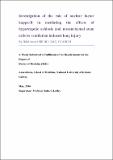| dc.description.abstract | Introduction: ARDS is a syndrome of acute respiratory failure that presents with progressive arterial hypoxemia, dyspnea, and a marked increase in the work of breathing. Mechanical ventilation is necessary to support life in ARDs but can worsen lung injury – this is termed ‘ventilation induced lung injury’. At the cellular level, respiratory epithelial cells are subjected to cyclic stretch, i.e. repeated cycles of positive and negative strain, during normal tidal ventilation. In aerated areas of diseased lungs, or even normal lungs subjected to injurious positive pressure mechanical ventilation, the cells are at risk of being overdistended, and worsening injury by disrupting the alveolar epithelial barrier. Reducing the tidal volume minimises this overdistention but results in elevated carbon dioxide in the bloodstream. This hypercapnic acidosis (HCA) in itself confers protection from stretch injury, potentially via a mechanisms involving inhibition of Nuclear Factor kappa B (NF-kB), a transcription factor central to inflammation, injury and repair. Mesenchymal stem cells are being investigated as a possible therapy for ARDS. We aimed to investigate the effects and mechanisms of action of HCA and of MSC therapy in stretch induced pulmonary epithelial injury, and focus on the role of the NF-kB pathway in mediating these effects.
Methods: We first established an in vitro model of pulmonary epithelial stretch induced injury. We applied cyclical strain to alveolar cells to simulate ventilator induced lung injury at a cellular level using a Flexercell apparatus. We trialled a number of cell lines, established the degree and duration of equibiaxial strain required to induce NF-kB induction, cell inflammation, injury and cell death. We conducted experiments to establish time of onset of injury and the impact of recovery time on the cells. We then compared the effects of hypercapnic acidosis versus normocapnia in parallel, on stretch-induced injury and NF-kB induction. Specific experiments examined the effect of different degrees of HCA, the effect of pre versus post treatment with HCA, and dissected the role of NF-kB. We subsequently examined the potential for MSCs, non-stem cells, and for MSC
secreted products, to attenuate injury and inflammation.
Results: We established that lung injury in vitro can be evident after as little as one hour of harmful cyclic stretch. Cyclic stretch of at least 20% injures lungs, promotes interleukin-8 release and induces NF-kB activation. HCA reduces pulmonary epithelial injury, decreases cytokine release, and inhibits NF-kB activation. The protective effects conferred by HCA are dose-dependent. HCA confers greater protection in the acute phase than following prolonged exposure. HCA inhibits pulmonary epithelial NF-kB activation by maintaining IkBa (an inhibitory factor) in the cytoplasm, and preventing stretch-induced of the latter. Overexpression of IkBa attenuates NF-kB activation and pulmonary epithelial injury. IkBa ‘occluded’ the effect of HCA on
NF-κB activation, in that there was no further decrease in NF-kB activation in the presence of HCA in pulmonary epithelial cells overexpressing IkBa. The use of the MSC secretome, whether conditioned medium or microvesicles derived from human MSCs, attenuated lung injury and inflammation after prolonged stretch, confirming the paracrine mechanism of benefit. The effect of MSCs on stretch induced injury did not appear to be mediated via reduction of NF-κB activation.
Conclusions: This novel in vitro model of pulmonary epithelial stretch induced injury broadens and extends our understanding of the molecular mechanisms of lung injury, and provides a useful prototype for testing strategies to attenuate lung inflammation in vitro. This series of studies broadens our understanding of HCA and lung injury and the complex relationship between VILI, HCA and NF-kB. It also confirms the protective paracrine effects of MSC therapy in prolonged stretch injury and paves the way for new experiments in this field aimed at translating MSCs towards clinical testing. | en_IE |
| dc.local.note | ARDS is a devastating lung disease. Mechanical ventilation can support the lungs, but may worsen lung injury - ' Ventilator Induced Lung Injury'. Decreasing the depth of the administered breath can reduce the injury. This protective ventilation results in higher levels of carbon dioxide in the bloodstream - 'hypercapnic acidosis (HCA)', which confers an independent protective effect. It does this by its effects on NFkB, a transcription factor in cells that directs genes involved in lung injury and inflammation. This work investigated the effects and mechanisms of HCA and Mesenchymal Stem Cells, another potential therapy, on lung injury at a cellular level. | en_IE |


